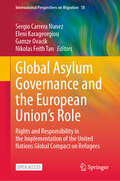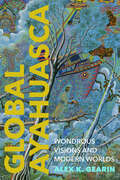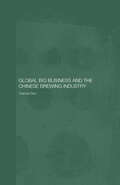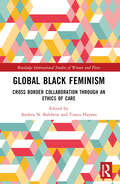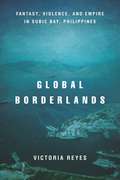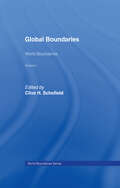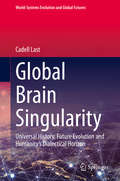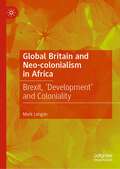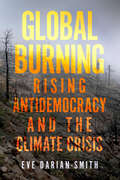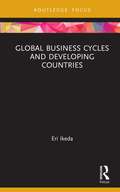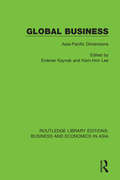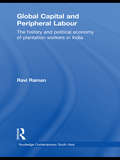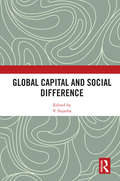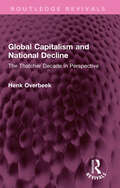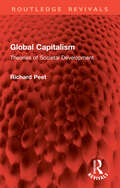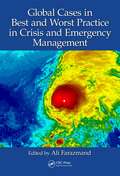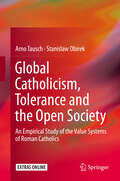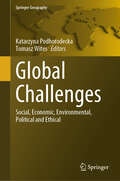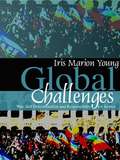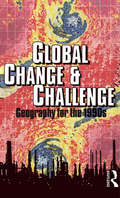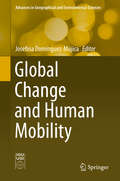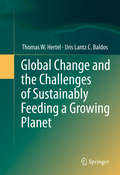- Table View
- List View
Global Asylum Governance and the European Union's Role: Rights and Responsibility in the Implementation of the United Nations Global Compact on Refugees (International Perspectives on Migration #18)
by Eleni Karageorgiou Sergio Carrera Nunez Gamze Ovacik Nikolas Feith TanThis open access book provides a state-of-the-field of the interactions between emerging national asylum governance systems and the 2018 United Nations Global Compact for Refugees (UN GCR). It provides a detailed examination of the relationship and compatibility between asylum governance and refugee protection and human rights, and the responsibilities for states and other implementing actors in cases of human rights violations. This book analyses the characteristics and impacts of existing and emerging asylum governance instruments and their practical implementation in selected countries hosting large communities of refugees around the world. Particular focus is given to the cases of Bangladesh, Brazil, Canada, Jordan, Niger, Serbia, South Africa and Turkey. Attention is put into regional and country-specific asylum instruments and actors from the perspective of their effectiveness, fairness and consistency with refugee protection and human rights standards as well as the UN GCR commitments. By doing so, the book identifies key lessons learned and offers a critical view on policies framed as `promising practices' so as to inform future steps in the UN GCR implementation and asylum governance more generally. As such, the book provides a better understanding of the concept of “mobility” in asylum governance, and the ways in which it is articulated into legal and policy instruments framed as "protection" and - in the language of the UN GCR - “third country solutions” for refugee mobility, including resettlement, private/community sponsorships, humanitarian corridors, in the European Union and around the world.
Global Ayahuasca: Wondrous Visions and Modern Worlds (Spiritual Phenomena)
by Alex K. GearinCeremonies of drinking the psychoactive brew ayahuasca have flourished across the planet in recent decades. Emerging from Indigenous roots in the Amazon rainforest, the brew is now envisaged by many as the spiritual gateway to archaic and primordial worlds, with reports of healing, spiritual insight, and awe-inspiring visions placing ayahuasca among the burgeoning field of psychedelic medicines. Astonished and allured by descriptions of ayahuasca experiences, researchers in psychology, anthropology, and philosophy have attempted to define the shared properties of the visions. In this book, Alex Gearin challenges this simplified obsession with universal truth and explores the embodied practices of contemporary ayahuasca drinkers to reveal how the brew has conjured contradictory experiences across the globe. These range from urban disenchantment and capitalist mastery to competitive sorcery and ecological harmony, wherein the plant-induced visions embody different attitudes towards capitalist modernity. Based upon ethnographic research among Shipibo healers in remote Peru, alternative medicine groups in urban Australia, and entrepreneurs and corporate managers in mainland China, Global Ayahuasca examines how the wondrous visions of ayahuasca are entangled within the social and economic realities that they illuminate, revealing different tensions, fears, and hopes of everyday modern life.
Global Big Business and the Chinese Brewing Industry (Routledge Studies on the Chinese Economy)
by Yuantao GuoFrom the 1970s to the 1990s, China implemented a wide array of industrial policies to build up indigenous big business groups in their attempts to ‘catch-up’ with the industries of the developed world. With its entry into the WTO, China is under huge pressure to pursue the market-friendly policies advocated by the advanced economies. This is the first book in English that applies the theories of big business, catch-up and state intervention to the Chinese brewing industry. Having gathered first-hand research in China, Yuantao Guo analyzes the relationship between big business, competition and state intervention in the context of developing economies, demonstrating the implications of the industrial concentration and value chain integration of the global big business revolution for catch-up by developing world industries, considering to what extent state intervention can allow them to meet the competitive challenge. Examining these themes in relation to the Chinese brewing industry, Yuantao Guo uses detailed case studies of the Yanjing and Tsingtao breweries in order to detail the struggles that Chinese brewers have faced. This book makes a significant contribution to modern day discussions on globalization.
Global Black Feminism: Cross Border Collaboration through an Ethics of Care (Routledge International Studies of Women and Place)
by Andrea N. Baldwin Tonya HaynesThis timely and informative volume centres how global Black feminist narratives of care are important to our contemporary theorizing and highlights the transgressive potential of a critical transnational Black feminist pedagogical praxis. This text not only details how such praxis can be revolutionary for the academy but also provides poignant examples of the student scholarship that can be produced when such pedagogy is applied. Drawing on narratives from Black women around the globe, the book features chapters on pedagogy, mentorship, art, migration, relationships, and how Black women make sense of navigating social and institutional barriers. Readers of the text will benefit from an interdisciplinary, global approach to Black feminisms that centres the narratives and experiences of these women. Readers will also gain knowledge about the historical and contemporary scholarship produced by Black women across the globe. This book is an invaluable resource for scholars and researchers, including graduate students in Caribbean feminisms, Black feminisms, transnational feminism, sociology, political science, the performing arts, cultural studies, and Caribbean studies.
Global Bollywood: Travels of Hindi Song and Dance
by Sangita Gopal Sujata MoortiBollywood movies and their signature song-and-dance spectacles are an aesthetic familiar to people around the world, and Bollywood music now provides the rhythm for ads marketing goods such as computers and a beat for remixes and underground bands. These musical numbers have inspired scenes in Western films such as Vanity Fair and Moulin Rouge.Global Bollywood shows how this currency in popular culture and among diasporic communities marks only the latest phase of the genre&’s world travels. This interdisciplinary collection describes the many roots and routes of the Bollywood song-and-dance spectacle. Examining the reception of Bollywood music in places as diverse as Indonesia and Israel, the essays offer a stimulating redefinition of globalization, highlighting the cultural influence of Hindi film music from its origins early in the twentieth century to today.Contributors: Walter Armbrust, Oxford U; Anustup Basu, U of Illinois, Urbana-Champaign; Nilanjana Bhattacharjya, Colorado College; Edward K. Chan, Kennesaw State U; Bettina David, Hamburg U; Rajinder Dudrah, U of Manchester; Shanti Kumar, U of Texas, Austin; Monika Mehta, Binghamton U; Anna Morcom, Royal Holloway College; Ronie Parciack, Tel Aviv U; Biswarup Sen, U of Oregon; Sangita Shrestova; Richard Zumkhawala-Cook, Shippensburg U.Sangita Gopal is assistant professor of English at the University of Oregon. Sujata Moorti is professor of women&’s and gender studies at Middlebury College.
Global Borderlands: Fantasy, Violence, and Empire in Subic Bay, Philippines (Culture and Economic Life)
by Victoria ReyesThe U.S. military continues to be an overt presence in the Philippines, and a reminder of the country's colonial past. Using Subic Bay (a former U.S. military base, now a Freeport Zone) as a case study, Victoria Reyes argues that its defining feature is its ability to elicit multiple meanings. For some, it is a symbol of imperialism and inequality, while for others, it projects utopian visions of wealth and status. Drawing on archival and ethnographic data, Reyes describes the everyday experiences of people living and working in Subic Bay, and makes a case for critically examining similar spaces across the world. These foreign-controlled, semi-autonomous zones of international exchange are what she calls global borderlands. While they can take many forms, ranging from overseas military bases to tourist resorts, they all have key features in common. This new unit of globalization provides a window into broader economic and political relations, the consequences of legal ambiguity, and the continuously reimagined identities of the people living there. Rejecting colonialism as merely a historical backdrop, Reyes demonstrates how it is omnipresent in our modern world.
Global Boundaries: World Boundaries Volume 1 (World Boundaries Series #Vol. 1)
by Clive H. SchofieldFirst published in 2002. Routledge is an imprint of Taylor & Francis, an informa company.
Global Brain Singularity: Universal History, Future Evolution and Humanity’s Dialectical Horizon (World-Systems Evolution and Global Futures)
by Cadell LastThis book introduces readers to global brain singularity through a logical meditation on the temporal dynamics of the universal process. Global brain singularity is conceived of as a future metasystem of human civilization that represents a qualitatively higher coherence of order.To better understand the potential of this phenomenon, the book begins with an overview of universal history. The focus then shifts to the structure of human systems, and the notion that contemporary global civilization must mediate the emergence of a commons that will transform the future of politics, economics and psychosocial life in general. In this context the book presents our species as biocultural evolutionary agents attempting to create a novel and independent domain of technocultural evolution that affords us new levels of freedom.Lastly, the book underscores the internal depths of the present moment, structured by a division between subject and object. The nature of the interaction between subject and object would appear to govern the mechanics of a spiritual process that is key to understanding the meaning of singularity inclusive of observers. Given its scope, the book will appeal to readers interested in systems approaches to the emerging world society, especially historians, philosophers and social scientists.
Global Britain and Neo-colonialism in Africa: Brexit, 'Development' and Coloniality
by Mark LanganThis book examines the implications of Brexit for Africa-UK relations amid a ‘new scramble’ for the continent. Engaging Nkrumah on neo-colonialism and recent scholarship on global coloniality, Langan here underscores concerns that Brexit was fuelled by an imperial romanticism that now gives rise to a Global Britain project involving the perpetration of ‘Empire 2.0’ in Africa. In this context, he examines UK elites’ pursuit of Brexit trade deals and the ‘development’ consequences of premature market opening. Throughout its chapters, this work assesses strategic usages of UK aid monies in terms of economic leverage and the externalisation of migration and highlights the impact of UK development finance and corporate activities for the health and wellbeing of workers and host communities. Significantly, Langan explores the UK’s pursuit of security interests and human rights criticisms and concludes by highlighting African agency to resist the Global Britain project amid the fragility of the British state itself.
Global Burden of Armed Violence 2015
by GenevaThe 2015 edition of the Global Burden of Armed Violence provides a wealth of data relevant to security and the post-2015 sustainable development framework. It estimates that 508,000 people died violently - in both conflict and non-conflict settings - every year in 2007–12, down from 526,000 in 2004–09. This trend is visible in non-conflict settings, where the proportion of women and girls is also slightly reduced, from 17 to 16 per cent. Yet, the number of direct conflict deaths is on the rise: from 55,000 to 70,000 per year over the same periods. Firearms are used in close to half of all homicides committed and in almost one-third of direct conflict deaths. Nearly USD 2 trillion in global homicide-related economic losses could have been saved if the homicide rate in 2000–10 had been reduced to the lowest practically attainable levels - between 2 and 3 deaths per 100,000 population.
Global Burning: Rising Antidemocracy and the Climate Crisis
by Eve Darian-SmithHow extreme-right antidemocratic governments around the world are prioritizing profits over citizens, stoking catastrophic wildfires, and accelerating global climate change. Recent years have seen out-of-control wildfires rage across remote Brazilian rainforests, densely populated California coastlines, and major cities in Australia. What connects these separate events is more than immediate devastation and human loss of life. In Global Burning, Eve Darian-Smith contends that using fire as a symbolic and literal thread connecting different places around the world allows us to better understand the parallel, and related, trends of the growth of authoritarian politics and climate crises and their interconnected global consequences. Darian-Smith looks deeply into each of these three cases of catastrophic wildfires and finds key similarities in all of them. As political leaders and big business work together in the pursuit of profits and power, anti-environmentalism has become an essential political tool enabling the rise of extreme right governments and energizing their populist supporters. These are the governments that deny climate science, reject environmental protection laws, and foster exclusionary worldviews that exacerbate climate injustice. The fires in Australia, Brazil and the United States demand acknowledgment of the global systems of inequality that undergird them, connecting the political erosion of liberal democracy with the corrosion of the environment. Darian-Smith argues that these wildfires are closely linked through capitalism, colonialism, industrialization, and resource extraction. In thinking through wildfires as environmental and political phenomenon, Global Burning challenges readers to confront the interlocking powers that are ensuring our future ecological collapse.
Global Business Cycles and Developing Countries (Routledge Explorations in Development Studies)
by Eri IkedaThis book investigates how global business cycles impact the economies of developing countries. Global business cycles, the wave-like movements of economic expansion followed by contraction in aggregate economic activities, impact all economies comprising the global economy. The patterns being shown in developing countries correspond increasingly to those in the global north, and yet there is a relative dearth of studies exploring whether global business cycles exist and how they operate in developing economies. This book explores how cycles operate at the global and sub-global developing country levels, with a particular focus on the level of development and the structure of the economies. Drawing an important distinction between cycles and fluctuations, the book criticises mainstream conceptualisation and identification of cycle phenomena, and instead proposes an alternative conception and methodology for the identification of cycles. Along the way, the book also delves into the manufacturing and rise of China, and other potential competitors in the industrial arena, as increasingly important drivers of global cycles and global economic growth. This book will be an important read for researchers and upper-level students of development economics and international political economy.
Global Business: Asia-Pacific Dimensions (Routledge Library Editions: Business and Economics in Asia #14)
by Erdener Kaynak Kam-Hon LeeThis book, first published in 1989, examines the practice of international business in the Asia-Pacific region. It examines the factors which have influenced its growth and dissemination and analyses particular elements in a transnational, cross-cultural and comparative way. By relating its conclusions to research findings from elsewhere, the Asia-Pacific area is placed in the context of the global business scene. By synthesizing the established body of knowledge and offering managerial insights the book has much to offer the researchers and policy makers of today.
Global Capital and Peripheral Labour: The History and Political Economy of Plantation Workers in India (Routledge Contemporary South Asia Series)
by Ravi RamanThis book presents a historical account of plantations in India in the context of the modern world economy. It brings history up to the present, thereby showing how history can assist in explaining contemporary conditions and trends. The author focuses on labour and economic development problems and uses the World Systems theory so as to demonstrate the practical utility of the theory and its limitations as a guide to historical research. Based on extensive archival research, the book interprets the dynamics of plantation capitalism by focusing on the work, life and struggle of the dalits on plantations in colonial and post-colonial South India as they evolved from the mid-19th century. It argues that these elements of the plantation life-world were fashioned by the specific characteristics of the workers' location within the capitalist world-economy, the then prevailing local social structure and the scheme of disciplining to which the workers were subjected to. Treating the relations among various social forces – the planting communities, the oppressed communities (dalits in India), the regional and national state, and the Imperial regime, this book fills a gap in academic literature on capitalism, economic development, and globalization.
Global Capital and Social Difference
by V. SujathaThis volume offers insights into ongoing, global socio-economic transformations by directing attention to the significance of labour, work, craft, community, social institutions, social movements and, emergent subjectivities in different parts of the world. This is in contrast to theories that project globalisation as a process driven exclusively by global capital and technology, a scheme in which some parts of the world forever will be ‘peripheries’ supplying labor and natural resources, the lives and work of those people purged of originality, meaning and value by the very construct that describes them. Together the chapters in the book present a non-essentialist and non-linear reading of global transformations by examining the relations and adaptations between economy, polity and society, which remains a fundamentally unresolved question in the social sciences. Combining a wealth of conceptual and empirical investigations, this book will be of interest to scholars and researchers of sociology, globalisation studies, anthropology, economics, development studies, and Area studies.
Global Capitalism and National Decline: The Thatcher Decade in Perspective (Routledge Revivals)
by Henk OverbeekFirst published in 1990, Global Capitalism and National Decline is a major contribution to the study of British political and economic decline. The author concentrates on the global nature of capitalism as the context for the development of national capitalism, and on the relationship between internal and external factors. A long-term view of British politics enables him to demonstrate that competing popular explanations of Britain’s crisis and the rise of Thatcherism in response to it, are in fact interconnected. The long decline of Britain originating in the 19th century, the inherent weakness of the post-1945 settlement, and the critical events of 1970s, acquire their fullest meaning when seen as different ‘layers’ of one and the same historical process. Henk Overbeek takes the story of Britain’s decline through to Margaret Thatcher’s tenth anniversary in office. His book will be invaluable to scholars and students of economics, politics, and history. it offers a clear perspective on the problems of national decline within a global context, and on Britain’s position in Europe and in the wider world.
Global Capitalism and the Crisis of Humanity
by William I. RobinsonThis exciting new study provides an original and provocative exposé of the crisis of global capitalism in its multiple dimensions - economic, political, social, ecological, military, and cultural. Building on his earlier works on globalization, William I. Robinson discusses the nature of the new global capitalism, the rise of a globalized production and financial system, a transnational capitalist class, and a transnational state and warns of the rise of a global police state to contain the explosive contradictions of a global capitalist system that is crisis-ridden and out of control. Robinson concludes with an exploration of how diverse social and political forces are responding to the crisis and alternative scenarios for the future.
Global Capitalism: Theories of Societal Development (Routledge Revivals)
by Richard PeetIn Global Capitalism (originally published in 1991), Richard Peet surveys the various approaches made by social theory towards seeing history in terms of its regional dynamics. He reviews environmental determinism, modernization, dependency, and world systems theories, and argues that the most capacious and dynamic model continues to be historical materialism.The volume presents a broad outline of global development through time, analysing primitive communism, lineage societies and the various kinds of tributary modes, and providing a closer examination of capitalism in terms of the phases and forms of its past and present. The author defends the centrality of structural Marxism to theories of global development and argues that its ideas can be furthered by the partial synthesis of other perspectives, such as the feminist critique.This book assumes no previous knowledge of the theories surveyed. It introduces complex material in an understandable form and will be valuable both to development professionals and to anyone interested in societal change.
Global Cases in Best and Worst Practice in Crisis and Emergency Management
by Ali FarazmandGlobal Cases in Best and Worst Practice in Crisis and Emergency Management is the first book to focus on select global cases from the perspective of best and worst practices in the context of crisis and emergency management. Bringing together the most established scholars and experts in the field, it offers theories along with an empirical, success
Global Catholicism, Tolerance and the Open Society: An Empirical Study of the Value Systems of Roman Catholics
by Arno Tausch Stanislaw ObirekThis book systematically assesses the political and social values of the more than 1.3 billion Catholics around the globe, by far the largest denomination of Western Christianity. Based on an extensive analysis of data from the World Values Survey and other global opinion surveys, the book sheds new light on the value systems and opinions of Roman Catholics. The authors highlight core problems and challenges the Church is currently facing in adapting to the modern world, including Catholic anti-Semitism, religious and sexual tolerance, and opinions towards democracy, while also offering an anthropological reflection on how well the Church is adapting or failing to adapt to the requirements of an open society.
Global Challenges: Social, Economic, Environmental, Political and Ethical (Springer Geography)
by Katarzyna Podhorodecka Tomasz WitesThis book addresses some of the most urgent global problems in today's world from a geographical perspective and highlights contemporary environmental, political, economic, social and geoethical aspects. The authors discuss causes, developments and challenges faced on a regional and global scale covering among others environmental issues such as loss of biodiversity, development of tourism, natural hazards and disaster risk reduction, migration issues, the global economic crisis and sustainable development. The presented collection of concepts and examples from specific regions offer a new outlook on globalization issues in the world as a whole. This volume can be used as a guide for students from different faculties who wish to understand global issues in the world from a geographical perspective. This book appeals to scientists and students of geography, economics, geopolitics, sustainability issues as well as policy makers and planners.
Global Challenges: War, Self-Determination And Responsibility For Justice
by Iris Marion YoungIn the late twentieth century many writers and activists envisioned new possibilities of transnational cooperation toward peace and global justice. In this book Iris Marion Young aims to revive such hopes by responding clearly to what are seen as the global challenges of the modern day. Inspired by claims of indigenous peoples, the book develops a concept of self-determination compatible with stronger institutions of global regulation. It theorizes new directions for thinking about federated relationships between peoples which assume that they need not be large or symmetrical. Young argues that the use of armed force to respond to oppression should be rare, genuinely multilateral, and follow a model of law enforcement more than war. She finds that neither cosmopolitan nor nationalist responses to questions of global justice are adequate and so offers a distinctive conception of responsibility, founded on participation in social structures, to describe the obligations that both individuals and organizations have in a world of global interdependence. Young applies clear analysis and cogent moral arguments to concrete cases, including the wars against Serbia and Iraq, the meaning of the US Patriot Act, the conflict in Palestine/Israel, and working conditions in sweat shops.
Global Change and Challenge: Geography for the 1990s
by Robert Bennett Robert EstallWe are now experiencing a period of unprecedented change; what amounts to a global revolution in our economy, society and awareness of the human impact on the environment. Global Change and Challenge examines some of the crucial issues facing society in the 1990s and how geography can contribute to their understanding and management. Using the broad theme of how societies adapt to change, the contributors seek to present a range of views on the `geography of change' in an accessible form for both school and university students. The general aim of the book is as much to encourage students to understand where we are and where we have some from, as to where we may be going. Robert Bennett and Robert Estall are both Professors of Geography at the London School of Economics. The contributors were all members of the Department of Geography at the LSE at the time of writing.
Global Change and Human Mobility
by Josefina Domínguez-MujicaThis book demonstrates the benefits of applying a new interdisciplinary approach that combines global change and human mobility. The term "globility" was coined in the year 2000 when the commission with the same name was created by the International Geographical Union with the purpose of theorizing about and asserting the concept of human mobility. First the book offers theoretical reviews of human mobility. Then it proceeds to study patterns of mobility in today's world as it faces new challenges in migration policies (including border controls, management of refugee movements, social initiatives to empower unauthorized immigrants), the integration issue, environmental hazards, and so on. The response to these diverse challenges reveals an increasing fluidity of human mobility and new forms of engagement of people on the move. Readers will obtain a better understanding of current human mobility from a large number of regions and from different thematic perspectives.
Global Change and the Challenges of Sustainably Feeding a Growing Planet
by Thomas W. Hertel Uris Lantz C. BaldosThis book explores the fundamental determinants of long term changes in agricultural land use and the associated implications for environmental and food security. The book is designed around the idea that each chapter focuses on one driver, or underlying determinant, of land use change at global scale. It starts with key factors which have been influential in the past, such as growth population, incomes and agricultural productivity, thereafter turning to new drivers such as biofuels, climate change and demand for environmental services. Specialized topics include food security outcomes, projections of future agricultural prices, greenhouse gas emissions, the role of globalization and market integration. The book draws heavily on the emerging body of literature on these topics, summarizes key findings and organizes these within a unifying economic framework.
